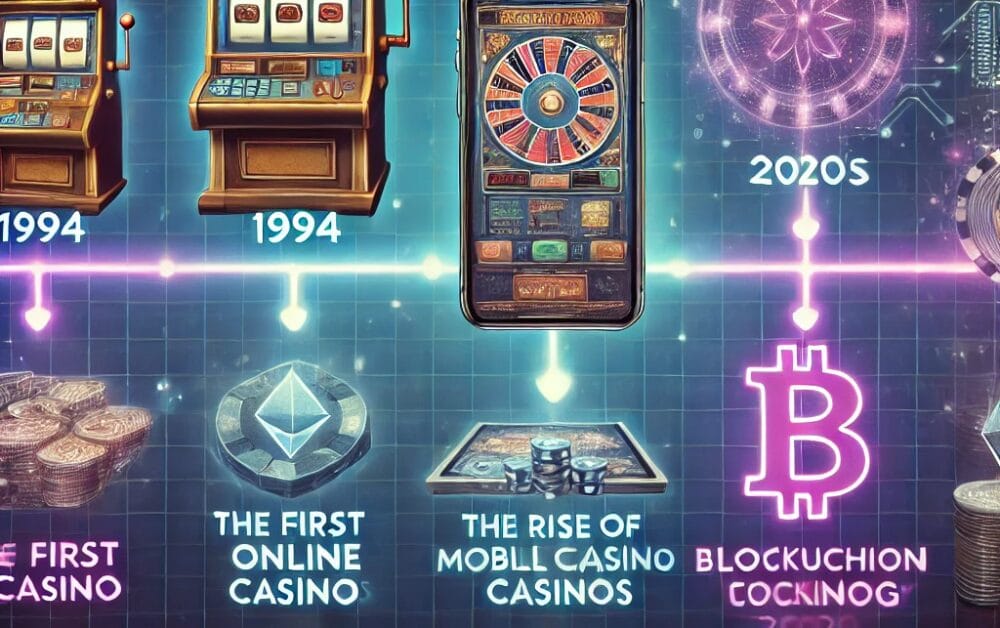オンカジは、インターネットを活用した新たな娯楽として1990年代に誕生し、瞬く間に世界中へ普及しました。現在ではモバイル化やライブカジノ、VR/AR技術の導入など、革新的な進化を続けています。
本記事ではオンカジの歴史を、時代ごとの特徴や規制、技術の変遷、そして今後の展望を交えながら詳しく解説していきます。オンカジの成り立ちを知ることで、プレイヤーや業界がどのように成長してきたのかを理解し、今後の発展を考える上での一助となれば幸いです!
オンカジ誕生の背景
まず、オンカジがどのような背景で誕生したのかを知っておきましょう。1990年代前半までは、カジノといえばラスベガスやモナコなどのランドカジノ(実店舗型カジノ)が中心でした。しかし、インターネットが一般に普及し始めると、人々が自宅のパソコンから楽しめるオンラインサービスが急速に拡大します。その流れを受け、「遠隔地からでもカジノを楽しめる」 という発想からオンカジが登場しました。
- インターネットの普及
ダイヤルアップ接続が徐々に広まり、メールや簡単なWebサイトが人々の生活に浸透していった時期です。通信速度はまだ遅いながらも、オンラインでの決済やゲーム配信の可能性が見いだされました。 - 実店舗カジノとの対比
それまでのカジノは、一部の地域に限られたレジャー施設でした。しかし、オンカジは国境を超えて誰でもアクセス可能なエンターテインメントへと変貌を遂げ、多くのプレイヤーを惹きつけることになりました。
1990年代:オンカジ黎明期
アンティグア・バーブーダの先駆け
1994年、カリブ海の島国アンティグア・バーブーダが「Free Trade & Processing Act(自由貿易・加工法)」を制定し、世界初となるオンカジ運営ライセンスを発行する法律が可決されました。このことが、オンカジ市場拡大の大きなきっかけとなりました。

この法律によりオンカジ運営に必要なライセンスが初めて発行され、合法的なオンラインギャンブルサイトが誕生する土壌が整ったのです。
ソフトウェアプロバイダーの登場
同じく1994年頃、マイクロゲーミング(Microgaming)がオンカジソフトウェアの開発をスタートし、最初期のオンカジ「The Gaming Club」などの基盤技術を提供。オンライン決済技術と暗号化技術の進化も後押しし、プレイヤーがクレジットカードや銀行送金で簡単に入出金できる仕組みが生まれました。
インターネット技術の進化
当時はダイヤルアップ接続が中心で通信速度が遅かったものの、画像や簡単なアニメーションなどを使ったカジノゲームが徐々に広がりました。ISDNやADSLの普及が進むと、より高品質なゲームがオンラインで楽しめるようになり、オンカジの認知度も上昇していきます。
2000年代:ソフトウェア進化&規制強化の時代
ソフトウェア・プロバイダの多様化
2000年代に入ると、オンカジソフトウェアを開発・提供する企業が一気に増加します。
- Microgaming(マイクロゲーミング)
- Playtech(プレイテック)
- NetEnt(ネットエント)
- Cryptologic(クリプトロジック)
これらの企業が競争力を高めるためにグラフィックやサウンド、ユーザーインターフェイスを強化し、オンカジのクオリティは飛躍的に向上していきました。
ボーナス戦略の普及
プレイヤー獲得競争が激化するなかで、各サイトが「ウェルカムボーナス」「入金不要ボーナス」「リロードボーナス」「VIPプログラム」など、多彩なボーナスキャンペーンを打ち出します。これがオンカジ固有の魅力となり、より多くのユーザーを獲得する重要な施策となりました。
規制とライセンス制度の整備
オンカジの利用者増加に伴い、各国でギャンブル依存症対策や税収確保などの観点から規制が強化されます。主要なライセンス発行国としては、アンティグア・バーブーダに加え、マルタ(MGA)、ジブラルタル、マン島、キュラソーなどが挙げられます。
アメリカのUIGEA(2006年)
特筆すべきは、2006年にアメリカで制定されたUIGEA(Unlawful Internet Gambling Enforcement Act)です。これはオンライン賭博関連の資金移動を制限する法律で、オンカジ業界に大きなインパクトを与えました。この結果、多くのオンカジサイトがアメリカ市場から撤退を余儀なくされ、各国向けのサービスがさらに細分化されていくことになります。
2010年代:スマホ時代 & ライブカジノの台頭
スマートフォン革命
2010年代に入り、iPhoneやAndroid端末が爆発的に普及したことは、オンカジ業界にも大きな変化をもたらしました。
- いつでもどこでもアクセス可能
- モバイル専用の最適化された操作性
- アプリやブラウザ両方で快適にプレイ
PCがなくてもスマホやタブレットでカジノゲームを楽しめるようになったことで、オンカジのユーザーベースがさらに拡大。今や「モバイルカジノ」は業界の主戦場ともいえる存在です。
ライブカジノの登場
さらに、ライブカジノ(Live Casino)という新形態が登場。スタジオや本物のカジノからディーラーの映像をリアルタイムでストリーミング配信し、プレイヤーは自宅からでも臨場感あるゲームを楽しめるようになりました。ライブブラックジャックやライブルーレット、ライブバカラなどは特に人気が高く、オンカジ業界の成長を牽引する主要コンテンツの一つとなっています。
ストリーミング技術の進化
高品質な映像配信技術や大容量の通信インフラが整備されたことで、ディーラーとのチャットやリアルタイムのやり取りが可能に。「オンラインでもリアルの雰囲気を味わいたい」というニーズを満たすライブカジノは、ランドカジノとの垣根をさらに縮める結果となりました。
2020年代:VR/ARと仮想通貨の導入
VR/AR技術の普及
ゲーミング産業全般がVR/ARに注目しており、オンカジも本格的な没入型体験が主流になる可能性があります。バーチャル空間でのプレイヤー同士のコミュニケーションやイベントが活発化するかもしれません。
- 没入感の高い体験: VRゴーグルなどの機器を用いて、まるで実店舗のカジノにいるかのような臨場感を味わえます。
- アバターとソーシャル要素: 他のユーザーとバーチャル空間でコミュニケーションを取りながらプレイすることで、新たなエンターテイメントの形が生まれます。
ただし、こうした新技術の導入によりプレイヤーの匿名性が高まる可能性もあり、規制当局や事業者はユーザーの本人確認(KYC:Know Your Customer)やAML(アンチマネーロンダリング)対策に細心の注意を払う必要が出てきます。バーチャル空間内の取引ログをどのように管理し、違法行為の監視や追跡を行うかが課題となるでしょう。
仮想通貨とブロックチェーンのさらなる活用
仮想通貨による入出金を導入しているオンカジも増えています。ブロックチェーン技術を活用した透明性の高いゲームや、トークンエコノミーを導入する事業者が増えることで、より公正で国際的に利用しやすいエコシステムが形成される可能性があります。
- 国際送金の容易さ: 仮想通貨は国境を超えた取引がスムーズで、従来の銀行送金よりも手数料が安く済む場合があります。
- ブロックチェーンによる公正性: ゲームの結果をブロックチェーン上に記録し、不正が介在しにくい仕組みを提供することで、プレイヤーの信頼を得る試みも注目されています。
一方で、仮想通貨ならではの匿名性が高い側面は、マネーロンダリング(資金洗浄)や不正資金の流通リスクを増大させる懸念があります。そのため、ライセンス取得国や各国の規制当局は、AML(アンチ・マネー・ロンダリング)やCFT(テロ資金供与防止)対策として、より厳密な本人確認・トランザクションモニタリングの導入を求める動きが加速しています。オンカジ事業者は、ブロックチェーンの透明性を活用しつつも、違法行為を防止するための監視体制を強化する必要があるでしょう。
地域特化型サービスの増加
オンカジは国際的に展開されていますが、各国の法規制や文化的背景に応じたサービスが増えていく傾向にあります。
- ローカライズされた決済手段: クレジットカードや電子ウォレットだけでなく、地域独自の決済方法に対応するカジノが増加。
- 言語サポートとカスタマーサポート: プレイヤーが不安なく遊べるように、サポート体制を地域密着型に整備。
これに伴い、それぞれの地域のAML規制に対応することがオンカジ運営企業の大きな課題となります。たとえばEU圏ではEU各国でのAML指令(5AMLD、6AMLDなど)の遵守が必要とされる一方、アジアや南米など他地域では独自の法律や監視体制が存在します。地域に合わせた柔軟なAMLポリシーを整備しつつ、グローバルな展開も行うことがオンカジ事業者には求められているのです。
依存症対策の強化と社会的責任
オンカジが世界中で普及する一方、ギャンブル依存症などの社会的問題も指摘されています。そのため、各国の規制当局はオンカジ事業者に対し、プレイヤーを保護するための取り組みを強く求めています。
- 自己規制ツールの提供
デポジットリミットや自己排除、クールダウン期間など、プレイヤーが自らの利用を制限できる機能を導入することが義務付けられるケースが増えています。 - 責任あるギャンブル(Responsible Gaming)
大手オンカジは、サイト内で依存症対策の情報を提供したり、専用の相談窓口を用意したりするなど、プレイヤーが適切にプレイできる環境づくりを進めています。 - 国ごとの規制強化
イギリスではUKGC(UK Gambling Commission)が厳格なルールを設けており、マルタ共和国(MGA)、ジブラルタル、マン島などもライセンス発行の際の審査を強化。これによって、安心・安全なオンカジを見極める目安が生まれました。
AML対策と依存症対策はともにオンカジの安全性と信頼性を確保するうえで欠かせないポイントです。資金洗浄や不正行為を排除しながら、プレイヤーを過度なギャンブルから守る取り組みが、今後さらに重要視されていくでしょう。
オンカジの歴史を踏まえた安全な遊び方
オンカジは、1990年代の黎明期から始まり、2000年代のソフトウェア進化と規制強化、2010年代のスマホ普及とライブカジノを経て、2020年代のVRや仮想通貨へと絶え間なく進化してきました。テクノロジーの発展とともに新たなエンターテイメントの形が生まれ、今後もVR/ARやブロックチェーンなどのイノベーションが続くことが期待されます。
一方で、各国の規制当局やオンカジ運営企業には、ユーザー保護やギャンブル依存症対策などの社会的責任だけでなく、AML(アンチ・マネー・ロンダリング)への対応も求められています。オンカジを楽しむうえでは、以下のポイントを押さえて安全性を確保しましょう。
- ライセンスを確認する
- 正規のライセンス(マルタ、ジブラルタル、UKGC、キュラソーなど)を取得しているかチェックし、違法・無許可サイトを避ける。
- 自己制限ツールを活用する
- デポジットリミットや自己排除設定などを利用し、計画的なプレイを心がける。
- 信頼できるサイト選び
- 第三者機関による監査や、公正性を証明する仕組み(RNG審査、ブロックチェーン活用など)を導入しているサイトを選ぶ。
- AML対策に留意する
- 登録時にKYC(本人確認手続き)や各種証明書類の提出が求められる場合は、正しく対応する。
- 不正取引や資金洗浄を防止するためのモニタリング体制が整っているサイトを選ぶ。
オンカジの歴史と現状、そして未来予想を踏まえ、健全なプレイ環境を選択しながら楽しむことが大切です。今後も技術が進歩するにつれ、オンカジの世界はさらに広がりを見せるでしょう。ぜひ、責任あるギャンブル(Responsible Gaming)の視点とAMLの観点を忘れずに、オンカジの魅力を存分に堪能してみてください。



